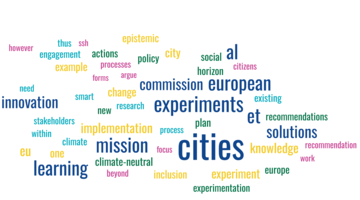Implementing Mission-oriented Experiments: Recommendations on Epistemic Inclusion for City Stakeholders Working in Climate Change Initiatives
Policy institutions have been increasingly investing in demonstrators, pilots, living labs, testbeds, and so forth, that focus on novel experimental approaches to dealing with climate change. In particular, cities have been advocated as ideal innovation sites for such experiments. However, we argue that insufficient attention has been given to accommodating the different forms of knowledge included and produced through the design, implementation, and evaluation of these city experiments (i.e., epistemic inclusion).
This article presents 10 recommendations for city policy officers and other stakeholders involved in delivering mission-oriented programmes of work to achieve epistemic inclusion in their attempts to drive innovation in cities. In illustrating our arguments, we engage with the EU Horizon Europe Mission of Climate-Neutral and Smart Cities as one example of such a programme. 100 European Cities have been selected as front-runners in this Mission.
The Mission will support these 100 cities in becoming “experimentation and innovation hubs” (European Commission, 2021b, p. 13) on route to all 100 cities becoming climate-neutral by 2030. These cities are only now starting their journeys and would greatly benefit from strategically considering epistemic inclusion issues. Establishing dialogues that are more open to controversies and paradoxes, failures, and a diversity of knowledge frameworks increases the chances for these cities to successfully address the complex and ramified challenges they face.

Publication date:
Related Green Deal Priorities
Related multimedia


CONTACT
For further details please contact co-leads Professor Chris Foulds (chris.foulds@aru.ac.uk) and Professor Rosie Robison (rosie.robison@aru.ac.uk).

This project has received funding from the European Union’s Horizon 2020 research and innovation program under grant agreement No 101036640. The sole responsibility for the content of this website lies with the SHARED GREEN DEAL HAS project and does not necessarily reflect the opinion of the European Union.